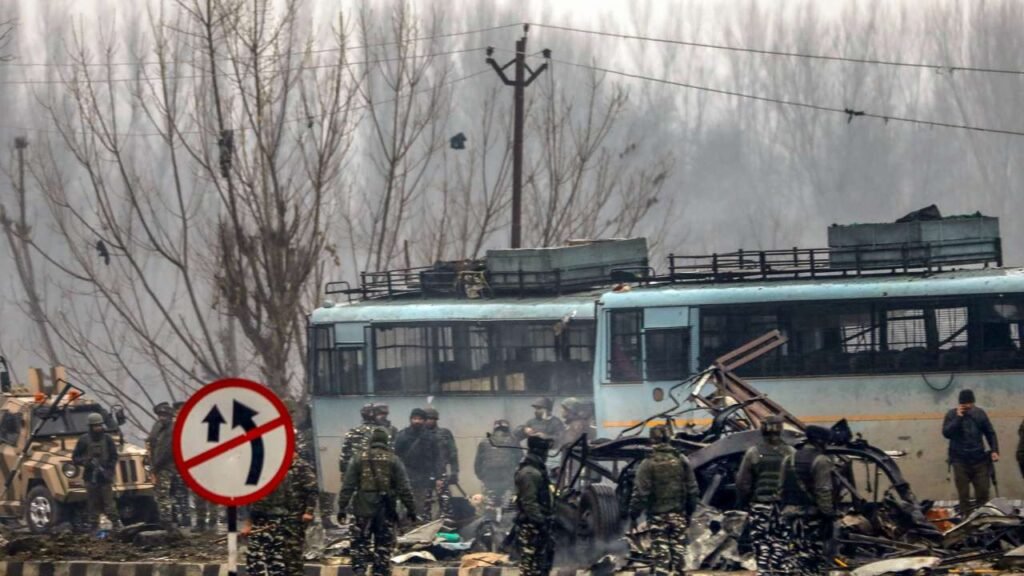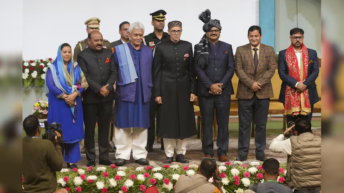|
Listen to article
Getting your Trinity Audio player ready...
|

February 14, 2021, marks the second anniversary of the dreadful terror attack orchestrated by the terrorist organization, Jaish-e-Mohammed (JeM) in Lethpora, Pulwama. 40 jawans from the CRPF were martyred and 20 others were injured in this fidayeen attack where Adeel Ahmed Dar, a Jaish terrorist drove an explosive-laden car into the convoy of the security forces. According to the Global Terrorism Index Report, the Pulwama attack was the 17th most fatal terrorist incident in the world in 2019 and the only one responsible for featuring India in the list. According to the Report, deaths attributed to terrorist attacks coordinated by JeM in India increased by 69 per cent in 2019 after the Pulwama attack.
The National Investigation Agency (NIA) probe and a 13,800-page chargesheet suggested that Umar Farooq, nephew of the Jaish Chief Masood Azhar was the mastermind behind this attack. An Afghanistan-trained terrorist, Umar was paid Rs. 10 lakhs in Pakistani currency to execute the strike and had infiltrated into India through the International Border along the Samba district in April 2018. The NIA investigations revealed that Masood Azhar and two other Jaish leaders were continuously guiding the Jaish infiltrators both before and after the attack.
Several significant developments have taken place in the Indian security infrastructure vis-à-vis the presence of terrorism-induced violence in Jammu & Kashmir. On February 26, 2019, India conducted air strikes on the biggest terrorist training camp of JeM situated in Balakot, Pakistan. On May 01, 2019, Masood Azhar was designated as a “global terrorist” by the United Nations. This was a huge diplomatic win for India as New Delhi had been working towards it since 2009 but was being stalled by China. In the Jammu & Kashmir Security Tracker Project it was observed that in the time period after Pulwama up until December 2020, at least 63 Jaish terrorists have been arrested and 65 have been neutralised by the Indian security forces, most of which were from Pulwama district. It is suggested that the actual figures may be higher.
The counterterrorism capabilities of the Indian security architecture have strengthened remarkably over the past few years. The declining number of terrorist attacks, increased number of arrests and interception of infiltrators before the execution of their plans is testimony to not just the efficiency of the security establishment, but also the determination of the government. The Border Security Forces unearthed the tunnel used by Umar Farooq to penetrate into the Indian territory. Likewise, similar tunnel-like structures have been unearthed in Samba and Jammu districts. In another incident in November 2020, acting on credible intelligence, the security forces engaged in the Nagrota encounter operation in which 4 JeM terrorists were neutralised and an unprecedented cache of weapons which was to be used to execute a Pulwama-like attack was recovered.
Over the past two years several top leader commanders of Jaish have been neutralised by the security forces in J&K. However, given the continued safe harbouring of Jaish Chief Masood by the Pakistani authorities, any attempt to eliminate the presence of Jaish from India will be futile. One of the obligations for Pakistan to avoid being blacklisted by the Financial Action Task Force [FATF], the watchdog for global money laundering and terrorism financing, was to act against Masood. Initially the deadline was given as the end of 2019 and later extended till February 2021. So far, Pakistan has failed to act. In a farcical attempt ahead of the next FATF meeting, an arrest warrant was issued against Masood on January 07, 2021, by the Pakistani court and the officials were directed to arrest him by January 18. However, there has been no progress on this front either.
In 2021, India commenced its tenure as a non-permanent member of the United Nations Security Council. It is important that India utilises its seat at the high table to steer the global efforts for enhancing counterterrorism efficiency and capabilities. Stringent measures must be taken not just against terrorist leaders like Masood, but also nation states that create breeding grounds for terror outfits and use them to wage proxy wars. In 1996 India had proposed the Comprehensive Convention on International Terrorism at United Nations. It is time more concrete efforts are made to revive the negotiations on similar lines.






Be a Mosad.
Good article, Soumya!
Good writing. Particularly with the statistics showing a clear path dependency between the measures undertaken and the results achieved.